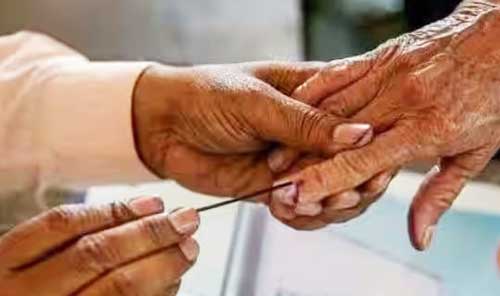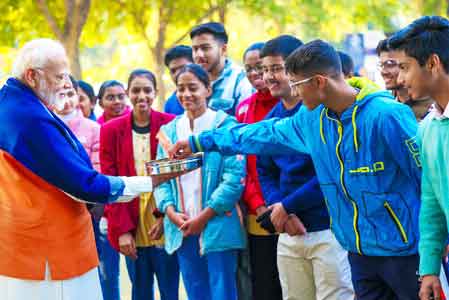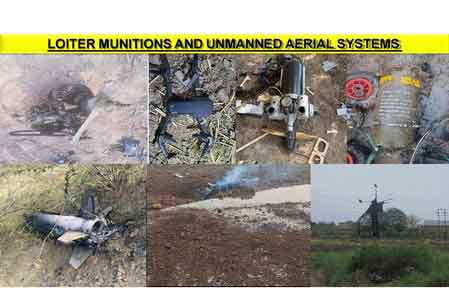The term "Simultaneous Elections" would broadly mean structuring the Indian election cycle in a manner that elections to Lok Sabha and State Assemblies are synchronised together. In such a scenario, a voter would normally cast his/her vote for electing members of Lok Sabha and State Assembly on a single day and at the same time, as per a discussion paper prepared in 2017.
The authors of the paper were Bibek Debroy, member, Niti Aayog and Kishore Desai, Officer on Special Duty, Niti Aayog in 2017.
The concept of simultaneous elections is in-fact not new to the country. Post adoption of the Constitution, elections to Lok Sabha and all State Legislative Assemblies were held simultaneously over the period 1951 till 1967 when the cycle of synchronized elections got disrupted, the note said.
In the current situation, the country witnesses elections to about 5-7 State Assemblies every year (except few exceptional years). Such a situation ends up adversely impacting all the key stakeholders - the Government (both Union and the State Governments), government employees/officials on election duty, general electors/voters, as well as political parties and candidates, the paper said.
The key adverse impacts that the existing electoral cycle leads to include impact on development programs and governance due to imposition of Model Code of Conduct by the Election Commission, frequent elections lead to massive expenditures by Government and other stakeholders; Engagement of security forces for significantly prolonged periods.
Any adult individual in India would normally cast his vote to elect members of Lok Sabha, State Assembly and the third tier every five years as and when the respective terms of these institutions are about to expire, the paper said.
Ideally, simultaneous elections should imply that elections to all the three tiers of constitutional institutions take place in a synchronised and co-ordinated fashion. What this effectively means is that a voter casts his vote for electing members for all tiers of the Government on a single day.
Having said that, the third-tier institutions is primarily a State subject as per the Constitution. Further, considering the facts that elections to the third tier institutions are directed and controlled by the State Election Commissions and their sheer numbers in the country is significantly large, it would be impractical and possibly impossible to synchronize and align election schedules to the third tier with that of Lok Sabha and State Assembly elections, the paper said.
Accordingly, for the purposes of this note, the term "Simultaneous Elections" is defined as structuring the Indian election cycle in a manner that elections to Lok Sabha and State Assemblies are synchronised together. In such a scenario, a voter would normally cast his/her vote for electing members of Lok Sabha and State Assembly on a single day and at the same time.
To clarify further, simultaneous elections do not mean that voting across the country for Lok Sabha and State Assemblies needs to happen on a single day. This can be conducted in a phase-wise manner as per the existing practice provided voters in a particular constituency vote for both State Assembly and Lok Sabha the same day, the paper said.
There are many compelling reasons in favor of simultaneous elections. Suspension of development programs, welfare activities due to frequent imposition of Model Code of Conduct, massive expenditures by Government and various stakeholders on frequent elections, black money, engagement of Government personnel and security forces for a prolonged period of time, perpetuation of caste, religion and communal issues etc.
Out of all these, the impact of frequent elections on governance and policy making is perhaps the most significant, the paper said.
Frequent elections force Governments and political parties to remain in perpetual “campaigning” mode thereby impacting the focus of policy making. Short-sighted populist and “politically safe” measures are accorded higher priority over “difficult” structural reforms which may more beneficial to the public from a longer term perspective. This leads to sub-optimal governance and adversely impacts the design and delivery of public policies and developmental measures.






PM Modi congratulates CBSE students, says 'one exam can never define you'
Prime Minister Narendra Modi on Tuesday congratulated lakhs of students across India who appeared for the Class 10 and 12 Board examinations, as the Central Board of Secondary Education (CBSE) announced the results.
Defence Minister Rajnath Singh reviews security with top officials, chiefs of forces
A day after Prime Minister Narendra Modi outlined the new normal in the country’s tough anti-terror policy, Defence Minister Rajnath Singh on Tuesday reviewed the security situation with top officials and chiefs of forces.
CBSE Class 10 results declared; girls outperformed boys once again
The Central Board of Secondary Education (CBSE) announced the Class 10 Board exam results for 2025 on Tuesday. This year, an impressive 93.66 per cent of students passed the examination. Over 23 lakh students appeared for the exam, which was held at 7,837 centres across 26,675 affiliated schools.
Chinese missile maker's stock tanks over 6 pc after India destroys its air weapon
The shares of Zhuzhou Hongda Electronics Corp Ltd, the Chinese defence company that manufactures the PL-15 missile, dropped sharply by 6.42 per cent or 2.56 Yuan to 37.33 Yuan on Tuesday, after India's air defence system successfully intercepted and destroyed the missile during the conflict with Pakistan.
Three terrorists killed in J&K gunfight
Three terrorists were killed on Tuesday in a gunfight with the joint forces in Keller area of Jammu and Kashmir's Shopian district. V. K. Birdi, IGP (Kashmir), told reporters that three terrorists have been killed.
CBSE announces Class 12 result; pass percentage 88.39 per cent
The Central Board of Secondary Education (CBSE) on Tuesday declared the results for the Class 12 examinations, in which girls once again outperformed boys.
India is eternally grateful to armed forces: PM Modi visits Adampur Airbase after 'Operation Sindoor'
Prime Minister Narendra Modi on Tuesday morning visited the Adampur Airbase in Punjab to meet Indian Air Force personnel and express the nation's gratitude for their courage and fearlessness in defending the country.
Devotees throngs Venuban Vihar; meditates and offer prayer to Lord Buddha
Along with the rest of the world, Buddha Purnima was observed here at Agartala with a traditional fervour to mark not only the day when Gautam Buddha was born, but also the day when he attained Nirvana under the Mahabodhi tree at Bodh Gaya.